- Home
- Fredric Brown
Nightmares & Geezenstacks Page 4
Nightmares & Geezenstacks Read online
Page 4
And suddenly the eunuch who had been outside was inside and had hold of him by the arm. The last thing he thought was that he now knew the one worrisome circumstance of invisibility: it was completely useless in pitch darkness. And the last thing he heard was the swish of the scimitar.
GREAT LOST DISCOVERIES II –
Invulnerability
The second great lost discovery was the secret of invulnerability. It was discovered in 1952 by a United States Navy radar officer, Lieutenant Paul Hickendorf. The device was electronic and consisted of a small box that could be carried handily in a pocket; when a switch on the box was turned on the person carrying the device was surrounded by a force field whose strength, as far as it could be measured by Hickendorf’s excellent mathematics, was as near as matters to infinite.
The field was also completely impervious to any degree of heat and any quantity of radiation.
Lieutenant Hickendorf decided that a man—or a woman or a child or a dog—enclosed in that force field could withstand the explosion of a hydrogen bomb at closest range and not be injured in the slightest degree.
No hydrogen bomb had been exploded to that time, but at the moment he completed his device, the lieutenant happened to be on a ship, cruiser class, that was steaming across the Pacific Ocean en route to an atoll called Eniwetok, and the fact had leaked out that they were to be there to assist in the first explosion of a hydrogen bomb.
Lieutenant Hickendorf decided to get lost—to hide out on the target island and be there when the bomb went off, and also to be there unharmed after it went off, thereby demonstrating beyond all doubt that his discovery was workable, a defense against the most powerful weapon of all time.
It proved difficult but he hid out successfully and was there, only yards away from the H-bomb—after having crept closer and closer during the countdown—when it exploded.
His calculations had been completely correct and he was not injured in the slightest way, not scratched, not bruised, not burned. But Lieutenant Hickendorf had overlooked the possibility of one thing happening, and that one thing happened. He was blown off the surface of the earth with much more than escape velocity. Straight out, not even into orbit. Forty-nine days later he fell into the sun, still completely uninjured but unfortunately long since dead since the force field had carried with it enough air to last him only a few hours, and so his discovery was lost to mankind, at least for the duration of the twentieth century.
GREAT LOST DISCOVERIES 3 –
Immortality
The third great discovery, made and lost in the twentieth century was the secret of immortality. It was the discovery of an obscure Moscow chemist named Ivan Ivanovitch Smetakovsky, in 1978. Smetakovsky left no record of how he made his discovery or of how he mew before trying it that it would work, for the simple reason that it scared him stiff, for two reasons.
He was afraid to give it to the world, and he knew that once he had given it even to his own government the secret would eventually leak through the Curtain and cause chaos. The U.S.S.R. could handle anything, but in the more barbaric and less disciplined countries the inevitable result of an immortality drug would be a population explosion that would most assuredly lead to an attack on the enlightened Communist countries.
And he was afraid to take it himself because he wasn’t sure he wanted to become immortal. With things as they were even in the U.S.S.R.—not to consider what they must be outside it—was it really worth while to live forever or even indefinitely?
He compromised by neither giving it to anyone else nor taking it himself, for the time being, until he could make up his mind about it.
Meanwhile he carried with him the only dose of the drug he had made up. It was only a minute quantity that fitted into a tiny capsule that was insoluble and could he carried in his mouth. He attached it to the side of one of his dentures, so that it rested safely between denture and check and he would be in no danger of swallowing it inadvertently.
But if he should so decide at any time he could reach into his mouth, crush the capsule with a thumbnail, and become immortal.
He so decided one day when, after coming down with lobar pneumonia and being taken to a Moscow hospital, he learned from overhearing a conversation between a doctor and nurse who erroneously thought he was asleep, that he was expected to die within a few hours.
Fear of death proved greater than fear of immortality, whatever immortality might bring, so, as soon as the doctor and the nurse had left the room, he crushed the capsule and swallowed its contents.
He hoped that, since death might be so imminent, the drug would work in time to save his life. It did work in time, although by the time it had taken effect he had slipped into semicoma and delirium.
Three years later, in 1981, he was still in semicoma and delirium, and the Russian doctors had finally diagnosed his case and ceased to be puzzled by it.
Obviously Smetakovsky had taken some sort of immortality drug-one which they found it impossible to isolate or analyze—and it was keeping him from dying and would no doubt do so indefinitely if not forever.
But unfortunately it had also made immortal the pneumococci in his body, the bacteria (diplococci pneumoniae) that had caused his pneumonia in the first place and would now continue to maintain it forever. So the doctors, being realists and seeing no reason to burden themselves by giving him custodial care in perpetuity, simply buried him.
DEAD LETTER
Laverty stepped through the open French windows and crossed the carpet silently until he stood behind the gray-haired man working at the desk. “Hello, Congressman,” he said.
Congressman Quinn turned his head and then rose shakily as he saw the revolver Laverty was pointing at him. “Laverty,” he said. “Don’t be a fool.”
Laverty grinned. “I told you I’d do this someday. I’ve waited four years. It’s safe now.”
“You won’t get away with it, Laverty. I left a letter, a letter to be delivered in case I’m ever killed.”
Laverty laughed. “You’re lying, Quinn. You couldn’t have written such a letter without incriminating yourself by telling my motive. Why, you wouldn’t want me tried and convicted—because the truth would come out, and it would blacken your name forever.”
Laverty pulled the trigger six times.
He went back to his car, drove over a bridge to rid himself of the murder weapon, then home to his apartment and to bed.
He slept peacefully until his doorbell rang. He slipped on a bathrobe, went to the door and opened it.
His heart stood still, and stayed that way.
The man who had rung Laverty’s doorbell had been surprised and shocked, but he had done the right thing. He had stepped over Laverty’s body into the apartment and had used the phone there to call police emergency. And he had waited.
Now, Laverty having been pronounced dead by the emergency squad, the man was being questioned by a lieutenant of police.
“Your name?” the lieutenant asked.
“Babcock. Henry Babcock. I had a letter to deliver to Mr. Laverty. This letter.”
The lieutenant took it, hesitated a moment, and then opened and unfolded it. “Why, it’s just a blank sheet of paper.”
“I don’t know about that, Lieutenant. My boss, Congressman Quinn, gave me that letter a long time ago. My orders were to deliver it to Laverty right away if anything unusual ever happened to Congressman Quinn. So when I heard on the radio—”
“Yes, I know. He was found murdered late this evening. What kind of work did you do for him?”
“Well, it was secret, but I don’t suppose the secret matters now. I used to take his place for unimportant speeches and meetings he wanted to avoid. You see, Lieutenant, I’m his double.”
RECESSIONAL
The King my liege lord is a discouraged man.
We understand and do not blame him, for the war has been long and bitter and there are so pathetically few of us left, yet we wish that it were not so. We sympathize with him fo
r having lost his Queen, and we too all loved her—but since the Queen of the Blacks died with her, her loss does not mean the loss of the war. Yet our King, he who should be a tower of strength, smiles weakly and his words of attempted encouragement to us ring false in our ears because we hear in his voice the undertones of fear and defeat. Yet we love him and we die for him, one by one.
One by one we die in his defense, here upon this blooded bitter field, churned muddy by the horses of the Knights while they lived; they are dead now, both ours and the Black ones—and will there be an end, a victory?
We can only have faith, and never become cynics and heretics, like my poor fellow Bishop Tibault. “We fight and die; we know not why,” he once whispered to me, earlier in the war at a time when we stood side by side defending our King while the battle raged in a far corner of the field.
But that was only the beginning of his heresy. He had stopped believing in a God and had come to believe in gods, gods who play a game with us and care nothing for us as persons. Worse, he believed that our moves are not our own, that we are but puppets fighting in a useless war. Still worse—and how absurd!—that White is not necessarily good and Black is not necessarily evil, that on the cosmic scale it does not matter who wins the war!
Of course it was only to me, and only in whispers, that he said these things. He knew his duties as a bishop. He fought bravely. And died bravely, that very day, impaled upon the lance of a Black Knight. I prayed for him: God, rest his soul and grant him peace; he meant not what he said.
Without faith we are nothing. How could Tibault have been so wrong? White must win. Victory is the only thing that can save us. Without victory our companions who have died, those who here upon this embattled field have given their lives that we may live, shall have died in vain. Et tu, Tibault.
And you were wrong, so wrong. There is a God, and so great a God that He will forgive your heresy, because there was no evil in you, Tibault, except as doubt—no, doubt is error but it is not evil.
Without faith we are noth—
But something is happening! Our Rook, he who was on the Queen’s side of the field in the Beginning, swoops toward the evil Black King, our enemy. The villainous one is under attack—and cannot escape. We have won! We have won!
A voice in the sky says calmly, “Checkmate.”
We have won! The war, this bitter stricken field, was not in vain. Tibault, you were wrong, you were—
But what is happening now? The very Earth tilts; one. side of the battlefield rises and we are sliding—White and Black alike—into—
—into a monstrous box and I see that it is a mass coffin in which already lie dead—
IT IS NOT FAIR; WE WON! GOD, WAS TIBAULT
RIGHT? IT IS NOT JUST; WE WON!
The King, my liege lord, is sliding too across the squares—
IT IS NOT JUST; IT IS NOT RIGHT; IT IS NOT…
HOBBYIST
“I heard a rumor,” Sangstrom said, “to the effect that you—” He turned his head and looked about him to make absolutely sure that he and the druggist were alone in the tiny prescription pharmacy. The druggist was a gnomelike gnarled little man who could have been any age from fifty to a hundred. They were alone, but Sangstrom dropped his voice just the same. “—to the effect that you have a completely undetectable poison.”
The druggist nodded. He came around the counter and locked the front door of the shop, then walked toward a doorway behind the counter. “I was about to take a coffee break,” he said. “Come with me and have a cup.”
Sangstrom followed him around the counter and through the doorway to a back room ringed by shelves of bottles from floor to ceiling. The druggist plugged in an electric percolator, found two cups and put them on a table that had a chair on either side of it. He motioned Sangstrom to one of the chairs and took the other himself. “Now,” he said. “Tell me. Whom do you want to kill, and why?”
“Does it matter?” Sangstrom asked. “Isn’t it enough that I pay for—”
The druggist interrupted him with an upraised hand. “Yes, it matters. I must be convinced that you deserve what I can give you. Otherwise—” He shrugged.
“All right,” Sangstrom said. “The whom is my wife. The why—” He started the long story. Before he had quite finished the percolator had finished its task and the druggist briefly interrupted to get the coffee for them. Sangstrom finished his story.
The little druggist nodded. “Yes, I occasionally dispense an undetectable poison. I do so freely; I do not charge for it, if I think the case is deserving. I have helped many murderers.”
“Fine,” Sangstrom said. “Please give it to me, then.”
The druggist smiled at him. “I already have. By the time the coffee was ready I had decided that you deserved it. It was, as I said, free. But there is a price for the antidote.”
Sangstrom turned pale. But he had anticipated—not this, but the possibility of a double-cross or some form of blackmail. He pulled a pistol from his pocket.
The little druggist chuckled. “You daren’t use that. Can you find the antidote”—he waved at the shelves—“among those thousands of bottles? Or would you find a faster, more virulent poison? Or if you think I’m bluffing, that you are not really poisoned, go ahead and shoot. You’ll know the answer within three hours when the poison starts to work.”
“How much for the antidote?” Sangstrom growled.
“Quite reasonable. A thousand dollars. After all, a man must live. Even if his hobby is preventing murders, there’s no reason why he shouldn’t make money at it, is there?”
Sangstrom growled and put the pistol down, but within reach, and took out his wallet. Maybe after he had the antidote, he’d still use that pistol. He counted out a thousand dollars in hundred-dollar bills and put it on the table.
The druggist made no immediate move to pick it up. He said: “And one other thing—for your wife’s safety and mine. You will write a confession of your intention—your former intention, I trust—to murder your wife. Then you will wait till I go out and mail it to a friend of mine on the homicide detail. He’ll keep it as evidence in case you ever do decide to kill your wife. Or me, for that matter.
“When that is in the mail it will be safe for me to return here and give you the antidote. I’ll get you paper and pen…
“Oh, one other thing—although I do not absolutely insist on it. Please help spread the word about my undetectable poison, will you? One never knows, Mr. Sangstrom. The life you save, if you have any enemies, just might be your own.”
THE RING OF HANS CARVEL
(retold and somewhat modernized from the works of Rabelais)
Once upon a time there lived in France a prosperous but somewhat aging jeweler named Hans Carvel. Besides being a studious and learned man, he was a likable man. And a man who liked women and although he had not lived a celibate life, or missed anything, had happened to remain a bachelor until he was—well, let’s call his age as pushing sixty and not mention from which direction he was pushing it.
At that age he fell in love with a bailiff’s daughter—a young and a beautiful girl, spirited and vivacious, a dish to set before a king.
And married her.
Within a few weeks of the otherwise happy marriage Hans Carvel began to suspect that his young wife, whom he still loved deeply, might be just a little too spirited, a little too vivacious. That what he was able to offer her—aside from money, of which he had a sufficiency—might not be enough to keep her contented. Might not, did I say? Was not.
Not unnaturally he began to suspect, and then to be practically certain, that she was supplementing her love life with several—or possibly even many—other and younger men.
This preyed on his mind. It drove him, in fact, to a state of distraction in which he had bad dreams almost nightly.
In one of these dreams, one night, he found himself talking to the Devil, explaining his dilemma, and offering the traditional price for something, anything, that would ass
ure him of his wife’s faithfulness.
In his dream, the Devil nodded readily and told Hans: “I will give you a magic ring. You will find it when you awaken. As long as you wear this ring it will be utterly and completely impossible for your wife to be unfaithful to you without your knowledge and consent.”
And the Devil vanished and Hans Carvel awakened.
And found that he was indeed wearing a ring, as it were, and that what the Devil had promised him was indeed true.
But his young wife had also awakened and was stirring, and she said to him: “Hans, darling, not your finger. That is not what goes there.”
VENGEANCE FLEET
They came from the blackness of space and from unthinkable distance. They converged on Venus and blasted it. Every one of the two and a half million human beings on that planet, all the colonists from Earth, died within minutes, and all of the flora and fauna of Venus died with them.
Such was the power of their weapons that the very atmosphere of that suddenly doomed planet was burned arid dissipated. Venus had been unprepared and unguarded, and so sudden and unexpected had been the attack and so quick and devastating had been its results that not a shot had been fired against them.
They turned toward the next planet outward from the sun, Earth.

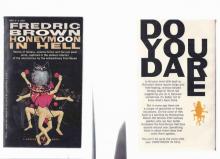 Hall of Mirrors
Hall of Mirrors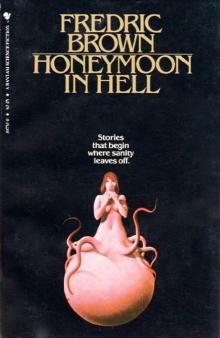 Honeymoon in Hell
Honeymoon in Hell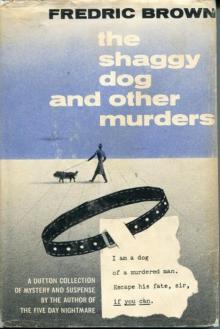 The Shaggy Dog and Other Murders
The Shaggy Dog and Other Murders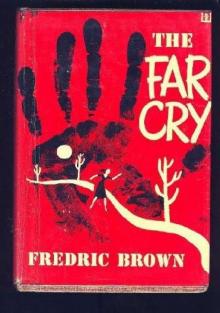 The Far Cry
The Far Cry Arena
Arena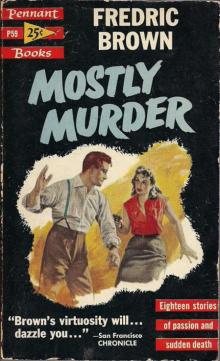 Mostly Murder
Mostly Murder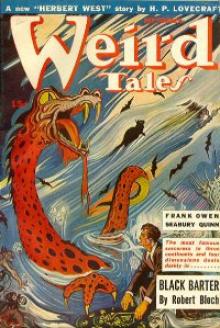 The Geezenstacks
The Geezenstacks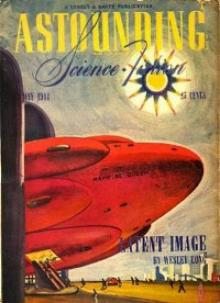 The Yehudi Principle
The Yehudi Principle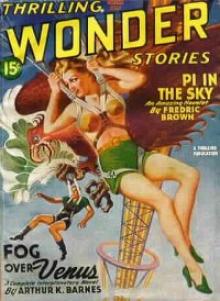 Pi in the Sky
Pi in the Sky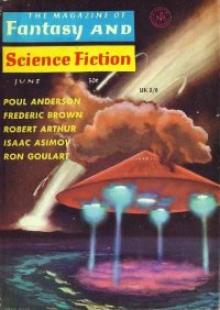 Eine Kleine Nachtmusik
Eine Kleine Nachtmusik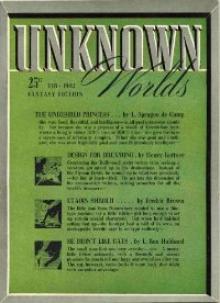 Etaoin Shrdlu
Etaoin Shrdlu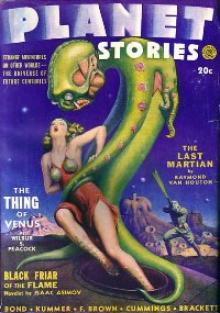 The Star Mouse
The Star Mouse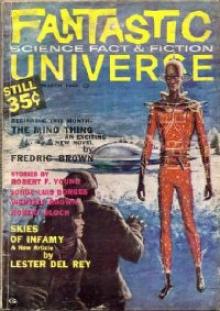 The Mind Thing
The Mind Thing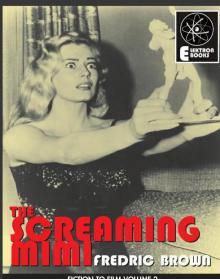 The Screaming Mimi
The Screaming Mimi The Fabulous Clipjoint
The Fabulous Clipjoint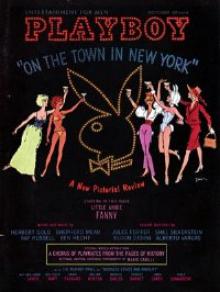 Puppet Show
Puppet Show It Didn't Happen
It Didn't Happen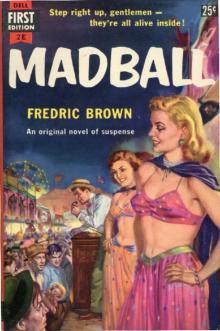 Madball
Madball Happy Ending
Happy Ending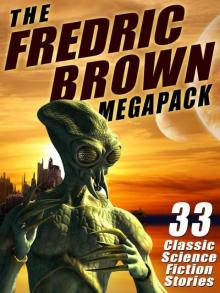 The Fredric Brown Megapack: 33 Classic Science Fiction Stories
The Fredric Brown Megapack: 33 Classic Science Fiction Stories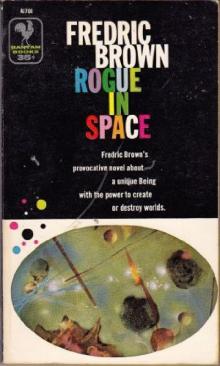 Rogue in Space
Rogue in Space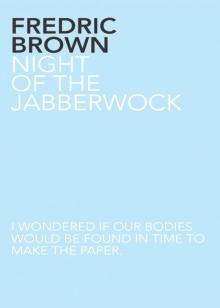 Night of the Jabberwock
Night of the Jabberwock The Dead Ringer
The Dead Ringer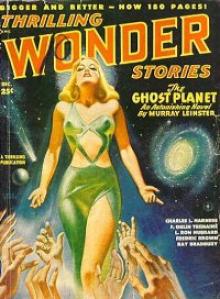 Knock
Knock We All Killed Grandma
We All Killed Grandma Space On My Hands
Space On My Hands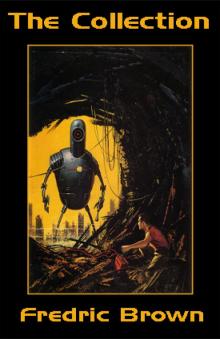 The Collection
The Collection The Second Fredric Brown Megapack: 27 Classic Science Fiction Stories
The Second Fredric Brown Megapack: 27 Classic Science Fiction Stories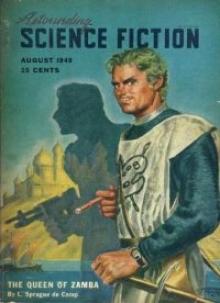 Letter to a Phoenix
Letter to a Phoenix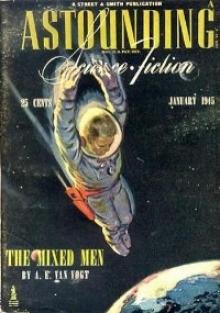 The Waveries
The Waveries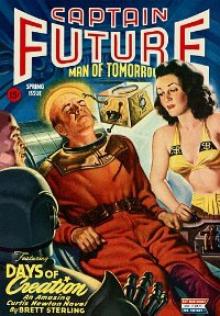 Nothing Sirius
Nothing Sirius The Deep End
The Deep End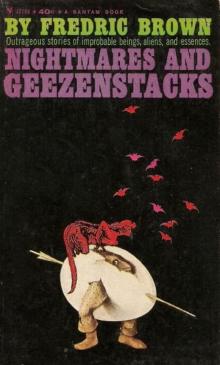 Nightmares & Geezenstacks
Nightmares & Geezenstacks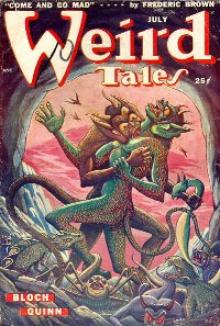 Come and Go Mad
Come and Go Mad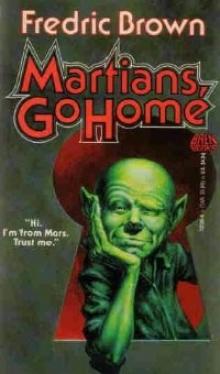 Martians, Go Home
Martians, Go Home